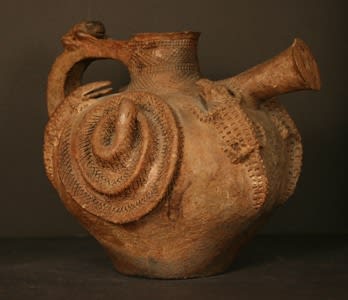African Terracotta Altar Vessel, 19th Century CE - 20th Century CE
Terracotta
11
AR.001 (LSO)
This astonishing ceramic vessel was probably made by the Yoruba if Nigeria, but stands alone in terms of stylistic and decorative complexity. The basic form is in itself not unusual,...
This astonishing ceramic vessel was probably made by the Yoruba if Nigeria, but stands alone in terms of stylistic and decorative complexity. The basic form is in itself not unusual, with a small base widening to a globular body. The spout arises from sharp shoulders, and is highly decorated with incised and impressed geometric patterns. There is a single strap handle joining the edges of the spout and vessel, opposite which there is a tubular spout emerging at almost 90 degrees to the vertical, with five small perforations in the pouring end. The surface of the vessel is decorated with two crocodiles, two snakes and a frog, which is climbing onto the handle. All of these are decorated with hatching and incised geometric designs.
The Yoruba are a Central Nigerian tribal group, originally descended from a Hausa migration from the northeast in about 900 AD. A small kingdom – Ile Ife – was founded by Oduduwa, followed by great sociopolitical expansion into Southwest Nigeria, Benin, and Togo. The influence of the city was felt far beyond these boundaries, however, and many smaller political entities were held under its sway. Communities were presided over by the Oba (king) and various senates (Ogboni), and councils made up of guild leaders, merchants and the lesser aristocracy (related to the Oba). The Yoruba have an exceptionally rich and diverse mythology, history and religious context, all of which are directly linked to their artistic output; in Yoruba society, this grouped heritage is known as the Itan.
The crocodile has been identified within the bestiaries of almost every tribe. It is associated with fortune telling (Kuba), creation myths (Senufo) or metamorphosis (Dogon). In Yoruba culture there are two main variants: the first is dubbed eghughu, and are comparatively docile, harmless creatures that are akin to mudfish in iconographic significance. The other, sharp-nosed form is agbaka, the “policeman of the waters”, who does the bidding of Olokun – himself a water god – and punishes the errant by overturning their canoes. The Oba became identified with Olokun; over time the crocodile thus became associated with kingship. The Oba is often shown holding a crocodile by the tail in each hand; this has been interpreted as his association with Olokun, and also with Ogiwu, god of thunder. Snakes are usually objects of fear, whereas frogs are usually considered to be symbols of good luck in cultures where they appear.
This is thus a socially important and impressive piece of African art.
The Yoruba are a Central Nigerian tribal group, originally descended from a Hausa migration from the northeast in about 900 AD. A small kingdom – Ile Ife – was founded by Oduduwa, followed by great sociopolitical expansion into Southwest Nigeria, Benin, and Togo. The influence of the city was felt far beyond these boundaries, however, and many smaller political entities were held under its sway. Communities were presided over by the Oba (king) and various senates (Ogboni), and councils made up of guild leaders, merchants and the lesser aristocracy (related to the Oba). The Yoruba have an exceptionally rich and diverse mythology, history and religious context, all of which are directly linked to their artistic output; in Yoruba society, this grouped heritage is known as the Itan.
The crocodile has been identified within the bestiaries of almost every tribe. It is associated with fortune telling (Kuba), creation myths (Senufo) or metamorphosis (Dogon). In Yoruba culture there are two main variants: the first is dubbed eghughu, and are comparatively docile, harmless creatures that are akin to mudfish in iconographic significance. The other, sharp-nosed form is agbaka, the “policeman of the waters”, who does the bidding of Olokun – himself a water god – and punishes the errant by overturning their canoes. The Oba became identified with Olokun; over time the crocodile thus became associated with kingship. The Oba is often shown holding a crocodile by the tail in each hand; this has been interpreted as his association with Olokun, and also with Ogiwu, god of thunder. Snakes are usually objects of fear, whereas frogs are usually considered to be symbols of good luck in cultures where they appear.
This is thus a socially important and impressive piece of African art.
